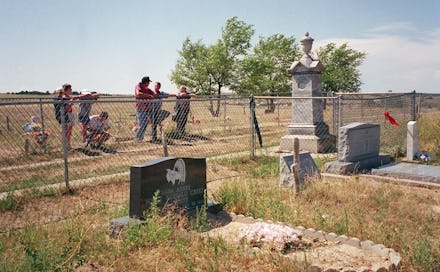3 Guns From Wounded Knee Massacre Are Being Auctioned, and Native Americans Aren't Happy

On June 11, about 100 items scoured from South Dakota's Pine Ridge and Rosebud Indian Reservations will be sold at auction.
Most of the objects date from the late 1800s and early 1900s and include a ceremonial pipe used by a respected tribal leader, the Gazette reports.
But of all the items being auctioned Saturday, three have sparked some controversy.
A trio of guns recovered from the site of the Wounded Knee massacre — where U.S. cavalry soldiers killed more than 150 Sioux men, women and children in 1890 — are among the artifacts up for grabs.
Some Native Americans have expressed displeasure with the weapons being sold — calling the decision "insulting" and insensitive to indigenous people.
"I find it very insulting," Trina Lone Hill, a historic preservation officer for the Oglala Sioux Tribe, told the Gazette. "It was a massacre; it wasn't just a skirmish. It was women and children being killed."
"How would the United States react if a weapon used during the September 11 attacks was found and later put on the auction block for money?" wrote Simon Moya-Smith in an op-ed for Indian Country Today Media Network. "How would the victims' families feel to know someone was seeking to profit off the very weapon that was used to terrorize and eventually kill their loved one?"
A similar controversy arose last month around a much more recent tragedy.
In May, George Zimmerman tried — possibly successfully — to auction the gun he used to kill unarmed black 17-year-old Trayvon Martin in 2012.
He described the weapon as "a piece of American History."
The Colorado resident putting the Wounded Knee items up for auction, for his part, has defended his decision to sell the guns.
"I don't have a vault or really I guess I don't have the means to care for it the way it should be," Paul Rathbun, whose grandparents gathered the items when they owned a general store near Pine Ridge, told the Gazette.
But he also won't say no to the money.
"And there's, of course, a bit of an economic factor," he said.